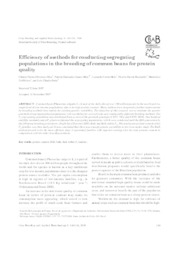Efficiency of methods for conducting segregating populations in the breeding of common beans for protein quality.
Efficiency of methods for conducting segregating populations in the breeding of common beans for protein quality.
Summary: Common bean (Phaseolus vulgaris L.) is part of the daily diet of over 300 million people in the world and is a staple food of low-income populations, due to its high protein content. Many authors have proposed a further improvement by breeding methods that exploit the existing genetic variability. The objective of this research was to evaluate the genetic potential of segregating bean populations with variability for several traits and conducted by different breeding methods. The F2 segregating population was developed from a cross of the parental genotypes CNFC 7812 and CNFC 8056.One hundred and fifty randomly taken F2 plants originated the segregating populations, which were conducted until the fifth generation by the following breeding procedures: Single Seed Descent (SSD), Bulk and Bulk within F2. The total grain protein content of the F5 families was then analyzed. It was concluded that there was enough genetic variability in the cross under study. The Bulk method proved to be the most efficient since it generated families with superior averages for the trait protein content in comparison with the other breeding methods.
Publication year: 2008
Types of publication: Journal article
Unit: Embrapa Rice & Beans
Observation
Some of Embrapa's publications are published as ePub files. To read them, use or download one of the following free software options to your computer or mobile device. Android: Google Play Books; IOS: iBooks; Windows and Linux: Calibre.
Access other publications
Access the Agricultural Research Database (BDPA) to consult Embrapa's full library collection and records.
Visit Embrapa Bookstore to purchase books and other publications sold by Embrapa.

